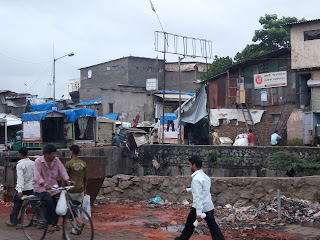We split into groups and visited different sites in the Daravi slum. My group went to a day care center which cares for children who are severely or moderately malnourished. There were seven children in a small room. The one boy cried the entire time we were there and the girls sat quietly. They were all so beautiful, but so small. Their heads were normal size, but the rest of their bodies so thin that many of them did not have the energy to do more than sit on the ground. The day care keeps each child for about two months feeding them a special diet until their weight has reached a normal point. They all waved goodbye as we left.
A reflection of students experiences learning about social entrepreneurship and NGOs in India.
Despite India's impressive economic growth over recent decades, the country continues to face challenges of poverty, illiteracy, corruption, malnutrition and terrorism. Approximately 70% of the country lives on less than U.S. $2.00 a day. Yet, India is a home to over 3 million NGOs. Many of these leaders are working tirelessly to improve the social conditions of the country.
"Introduction to Social Entrepreneurship: A Case Study of India" will challenge students to confront more advanced issues faced by today's social entrepreneurs. The field experience of the course will take students to Mumbai and India. Students will meet Social Entrepreneurs and NGOs working at all societal levels to understand grassroots' needs as well as the overall public health infrastructure in India.
Saturday, August 04, 2012
My Day in the Slums (Elizabeth)
We split into groups and visited different sites in the Daravi slum. My group went to a day care center which cares for children who are severely or moderately malnourished. There were seven children in a small room. The one boy cried the entire time we were there and the girls sat quietly. They were all so beautiful, but so small. Their heads were normal size, but the rest of their bodies so thin that many of them did not have the energy to do more than sit on the ground. The day care keeps each child for about two months feeding them a special diet until their weight has reached a normal point. They all waved goodbye as we left.
Empowered women
SNEHA Mumbai
- 52% adolescent girls/57% boys think beating is justified
- Every year, the national crime rate against women increases by 7%.
- In 2011, there were 24,000 rapes and 8,618 dowry deaths (typically burnings of women perpetrated by husbands and in-laws unhappy with the amount of dowry brought into marriage. Why burning? Because it’s difficult to prove homicide. This occurs in the world we live in.)
- 12 million girls were aborted in India in the last 30 years.
- All of the numbers above are likely to be under-reported



